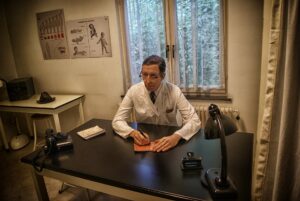Interpersonal Chemistry with Physicians and Therapists

A Trip That Leads to a Trip to the Doctor
A young woman is walking through a parking lot with her friends, heading back to the car after the ball game. She trips over one of those cement wheel stops and twists her ankle. Her friends help her up and she continues on to the car. It seems relatively okay, but the next morning her ankle is swollen and blue and she can’t walk on it. So off to Urgent Car, where the physician takes x-rays, determines that no bones are broken, and puts on one of those big walking boots to stabilize a sprained ankle. On the way out of Urgent Care she bursts into tears right in the waiting room.
Welcome to the Neuroscience Research and Development Consultancy website. If you would like more information about any of the topics we cover on our site, or if you have a question. a comment, or a critique, please send it to us at: Comment@NeuroSciRandD.com
Oh, God, Tell Me This Isn’t Happening!
It’s completely embarrassing but she can’t help it. She slumps down in one of the uncomfortable chairs and can’t stop the tears. The nurse/receptionist asks if she’s okay. Clearly she’s not. Between sobs she confesses to the nurse that she’s been depressed for the past few months and she doesn’t know why. And this ankle sprain and ankle boot are just too much. it put her over the top. The nurse disappears for a few minutes and comes back with a referral from the Urgent Care physician. It’s a referral to a psychotherapist

One of our Readers in Los Angeles, California wrote to us about a therapist she didn’t like:
I just stopped therapy. I didn’t know what else to do. I was referred to her for my depression but I really didn’t like her. I couldn’t keep going so I just stopped going. What’s a person supposed to do if you can’t stand the therapist you were referred to?
This reader’s email prompted us to write this page. It’s a common dilemma. There’s this thing, this essence, that everyone knows about and talks about but that’s hard to define. It’s “interpersonal chemistry”, that gut-level impression when two individuals meet each other and begin a conversation, if it even gets as far as a conversation. The discussions usually comes up in romantic contexts, like dating situations, but it’s there whenever any person meets another person. And meeting a new therapist is definitely a situation where chemistry is important. On the one hand you did the right thing to stop going, but, on the other hand you cheated yourself if you stopped therapy. Therapy is about healing. You need to heal. So, for yourself, for your own benefit, you need to find a therapist with whom you have good chemistry. Start the search and don’t stop until you find one.
It’s For The Best, This Seeing a Therapist, or Is It?
Back to our young women in tears in the Urgent Care waiting room with a slip of paper in her hand referring her to a therapist. She’s embarrassed but she knows the doctor and the nurse are right. She’s been depressed and it’s been getting worse. She needs help and she definitely doesn’t want some stupid drug the doctor might give her. So she goes home, thinks about it for a week, gets her nerve up, and calls the number on the piece of paper. She makes an appointment for the next week, after work, at 5:30. The time comes, she goes to the therapist’s office and they have a session. And she leaves feeling really in trouble. She absolutely doesn’t like the person. She can’t see herself, can’t make herself go back. Now what?

The Struggle Inside Has Begun
Maybe it’s just me. Maybe she rubs me the wrong way because of me. Maybe she’s an okay therapist but she just reminds me of someone I don’t like. She just seemed like a “know-it-all” when she really just met me. And the way she was dressed, I just don’t think we’re a good match. But I’m always awkward with new people, especially new important people, so maybe it really is just me. I think she reminds me of that damn girl in high school, the mean one, that I never liked. Oh, God, I don’t know what it is, but I’m not going back. So, once again, now what?
Stop The Struggle and Let Yourself Be Correct, Let Yourself Choose
The relationship you have with your therapist should be something special. It’s a relationship that lives on a delicate boundary, more inside your head than almost anyone else. But not a love relationship, not a friend, not a romance, not close like that. So you have to feel comfortable from almost the beginning. Because how eventually successful the whole course of therapy will be depends on the quality of this relationship. So, if you have that first session with the therapist and, as you leave the office, feel, “Yes, this will work,” that’s good. But if that “struggle inside” starts, it’s not important why it’s a poor fit. It’s only important that it is a poor fit. (Maybe, if you want to, you can eventually understand the “why” as you work with the right therapist.) So, go find a good-fit therapist. Really. Don’t worry about it, just do it.

There Are Lots of Therapists and Lots of Styles of Therapy
So let’s leave our depressed young woman with the sprained ankle, the big walking boot on one foot, and let her find the right therapist. Because this discussion applies to everybody. And, it’s not just therapists, it applies equally to physicians. These medical relationships need to work for you. Finding doctors, including therapists, with the right personal chemistry for you does sort of feel like dating. If you dump a doctor for another one, if the dumped doctor is good and well trained, the doctor won’t mind. They know, or at least should know, what you’re seeking, what you need for yourself to get well, and want you to find the right clinical person. It’s not personal, and they shouldn’t feel offended.
An Awkward Relationship with a Clinician Can Keep You Sick
It’s true, an awkward relationship with a clinician can keep you sick. This question has actually been studied a lot. Of course, the academic people studying such relationships can make understanding their results seem complicated. They talk about statistics, effect sizes, and repairing therapeutic ruptures (which sounds pretty awful). But the bottom line of all the research jargon is that a good relationship with your doctor increases your chances of getting well. And an awkward, uncomfortable relationship makes it more likely that you’ll stay sick. So, there’s too much riding on the quality of the interaction to accept mediocre. A great relationship would be wonderful, but it has to be at least good. And, good is good enough. There’s nothing wrong with “good”.

Diving Into Why the Therapeutic Relationship Is So Important
The patient-therapist (or client-therapist) is a relationship. But that’s not really the heart of the matter. Therapy is a learning, an education. There’s a step one followed by a step two. It’s a process. And your therapist knows this. They need to guide your way forward to talk about what’s hard to talk about. They come to realize what you’re up against in life. And almost certainly they’ve seen that dilemma before. The more you can “let it all hang out,” the more authentic the therapy will become. The therapist is your guide to help you on a path that scares you, that causes you embarrassment, that can seem awful. But by walking the path with the right therapist you come out the other side with your burden lessened. It has to start in the right place for you to get to where you need to go.
A Comment Thought About Those “Therapeutic Ruptures”
We mentioned this phrase above but need to return to it because it’s one important reason why you have to start with a good therapeutic relationship. Human beings don’t have personal connections that go smoothly forever. There are bumps in the road. You’re working to learn more about yourself and about your family and friends. You’ll discover some things that are wonderful. And, some things that you don’t want to know. That’s hard. And, your therapist “did it”. Maybe argument time, maybe confrontation. So we have a therapeutic rupture. Do you withdraw, storm out, and never go back? Do you emotionally withdraw, clam up, and stop the progress? Does anger boil out? Will it ruin everything? As with any committed relationship (like a marriage), the stronger it starts and the better it builds over time the more likely that a rupture can be fixed as part of the process.

Back to Interpersonal Chemistry with Physicians and Therapists
It’s apples and oranges to compare a personal union (dating or marriage) with a professional medical healing relationship. A good spouse can “save your life” from you being less than you could be. A good doctor can save your life from illness and death. But there are parallels. And chemistry is one of these parallels. If you go on a blind date you usually know pretty quickly if it’s not going to work. And, it might take a few dates to tell if it will work. Same with a therapist or physician. You know pretty quickly if it’s not going to work. It you feel that, trust your gut, and get out, exit stage right. As with dating, the longer you hang in there with a poor connection the more you delay finding a better one.
